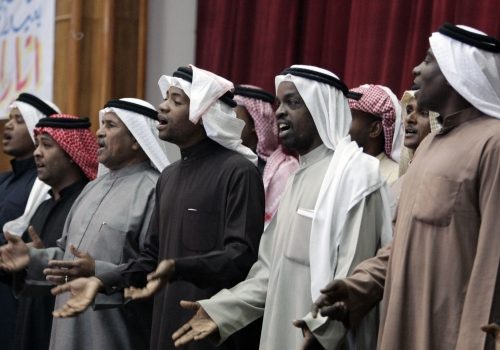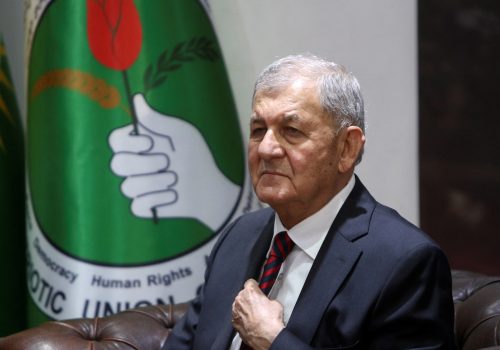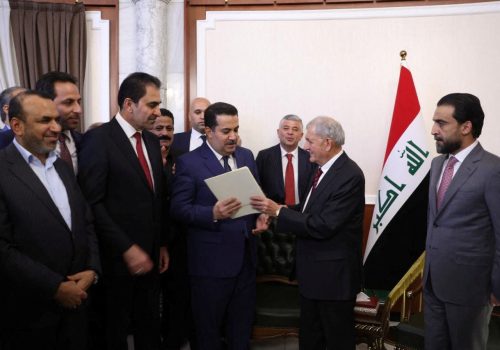How the international community can help Iraq on a path toward democratic stability
Iraq’s political landscape has undergone significant transformations over the years, shifting from a constitutional monarchy to a republic and, later, to a federal parliamentary system. Now, calls for constitutional reforms are raising the prospect of another shift—to a presidential system.
However, the core issues in Iraq lie not within the country’s political structure but rather in the quality of its leadership. Effective governance and stability require democratic leaders and a robust civil society. The international community, particularly the United States and Europe, must play a constructive role in guiding Iraqi civil society toward a more democratic and stable future.
Iraq faced immense challenges during its monarchy era, from 1924 to 1958. Political instability, limited representation, socioeconomic inequality, regional tensions, foreign interference, and inadequate development plagued the country. The monarchy’s dominance hindered democracy, while socioeconomic disparities and regional divisions fueled unrest. Insufficient infrastructure, education, and healthcare further impeded progress.
In 1958, public discontent led to the monarchy’s overthrow. During the subsequent republic era, from 1958 to 2003 and under leaders like Saddam Hussein, Iraq witnessed a transition to a presidential republic. Divisions, instability, foreign conflicts, and crippling sanctions revealed the limitations of both systems. Iraq’s journey towards stability and effective governance remains an ongoing struggle.
The US-led invasion in 2003 brought about a new constitution and transformed Iraq’s political system into a federal parliamentary republic. The parliament emerged as the most powerful government branch, with the authority to vote in or out the president and prime minister, pass the budget bill, ratify international conventions, and approve cabinet and ambassadorship positions. The parliament, which is known as the Council of Representatives, is one of the most diverse elected councils in the Middle East; Iraqi groups, particularly women and minorities, are represented proportionally. Despite obstacles and the influence of money and weapons, Iraq has managed to hold national elections regularly every four years. This has resulted in peaceful transitions of power, a significant achievement that was lacking in Iraq prior to 2003.
Recently, in his Foreign Policy article, former Iraqi President Barham Salih called for what is essentially a presidential system. This call harkened back to the message of the Tishreen protest movement, made up of Iraqis taking to the streets in October 2019 to demand political reform. Multiple Shia political figures have also expressed their support for a presidential system.
While some argue that a shift to a presidential system—with a balanced legislative branch and a president elected through popular vote—could help overcome Iraq’s sectarian divide and facilitate reforms, what really matters is the quality of leadership and the resilience of civil society. There is a misperception among the Iraqi youth as well as the elite that only a strongman can fix Iraq’s many problems while the issues are way more complex than that. The current constitution, despite its shortcomings, provides the necessary tools that Iraqi leaders need to establish a stable, prosperous, and democratic country. For example, the Iraqi Political Party Law of 2015 provides legal tools to establish new parties—currently, there are hundreds of new parties registered in Iraq. This may lead to chaos, but it defuses political disagreement among various groups. Additionally, the constitution gave significant executive power to a prime minister to rule the country, while giving the parliament strong oversight.
What Iraq truly needs are democratic leaders who prioritize the nation’s interests over personal gain. For example, Iraq needs leaders that will prioritize job-creation reforms, rather than channeling public wealth to buy votes. Iraq also needs a strong civil society capable of uniting Iraqis on crucial matters. Leaders must be willing to make necessary compromises, embrace diversity, and treat citizens based on democratic principles rather than sectarian or ethnic identities. The achievement of democracy and stability relies on democratic leadership and a vibrant civil society that effectively mobilizes people towards shared national goals.
Unfortunately, Iraq currently lacks a robust civil society capable of nationwide mobilization and unity. Furthermore, the existing political party structure fails to embrace Iraq’s diversity, favoring specific sects, ethnicities, or religious groups. Although the October 2019 demonstrations showed promise in uniting Iraqi youth across ethnic and sectarian lines on economic and justice issues, their aspirations were not fully realized in reshaping the political landscape.
How the international community plays a role
Iraq’s current parliamentary system faces significant obstacles, such as sectarianism, ethnic division, political fragmentation, corruption, weakness in its institutions, security concerns, and socioeconomic and development issues. Tackling these issues requires a concerted effort to strengthen institutions and, in those institutions, promote inclusivity, combat corruption, foster reconciliation, and ensure effective governance. But efforts to take on these challenges shouldn’t focus solely on institutional change—they should also focus on investing in the current and future leaders of the country.
The international community, particularly the United States and Europe, has made significant investments in Iraq’s democratic system. Unfortunately, corruption and sectarianism have undermined these investments over time, highlighting that it’ll take an extensive and holistic strategy to improve democracy in Iraq.
That strategy should first include investments in Iraqi youth, as they will ultimately shape the country’s future. The United States and European Union should specifically prioritize empowering Iraqi youth, developing their leadership abilities, and creating a sense of national unity. By investing in education, creating opportunities for civic participation, and providing platforms for dialogue and cooperation among the diverse communities within Iraq’s borders, international support could foster a new generation of democratic leaders that prioritize all Iraqis’ interests over individual interests.
Additionally, the international community should increase its financial support for civil-society organizations in Iraq, as these play an instrumental role in reconciling ethnic divisions while promoting democratic principles among younger people.
By supporting the development of Iraqi youth and promoting a robust civil society, the international community can help invest in Iraq’s democratic future, unify all Iraqis, and lead the country towards peace, prosperity, and democratic stability.
Sarkawt Shamsulddin is a nonresident fellow at the Atlantic Council’s Middle East Programs and was a member of the Iraqi Parliament from 2018 to 2021.
Further reading
Fri, Mar 24, 2023
Black Iraqis have been invisible for a long time. Their vibrant culture and struggle must be recognized.
MENASource By Sarah Zaaimi
Black Iraqis are not only living on the geographical margins of urban agglomerations but also on the margins of society and its structures.
Mon, Nov 7, 2022
Iraq lacks strategy on many governance fronts. It’s never too late to rectify this unforgivable deficiency.
MENASource By Abbas Kadhim
Post-2003 Iraq has shown a gross lack of strategy on many governance fronts. It’s never too late to rectify this unforgivable deficiency.
Fri, Nov 4, 2022
Iraq has a new government. The United States would benefit from broad engagement with all Iraqi stakeholders.
MENASource By C. Anthony Pfaff
Such an approach will typically yield modest results, but these results can accumulate and place the United States in a better position.
Image: Iraqi lawmakers attend a parliamentary session to vote on the federal budget at the parliament headquarters in Baghdad, Iraq, June 11, 2023. Iraqi Parliament Media Office/Handout via REUTERS ATTENTION EDITORS - THIS IMAGE HAS BEEN SUPPLIED BY A THIRD PARTY


